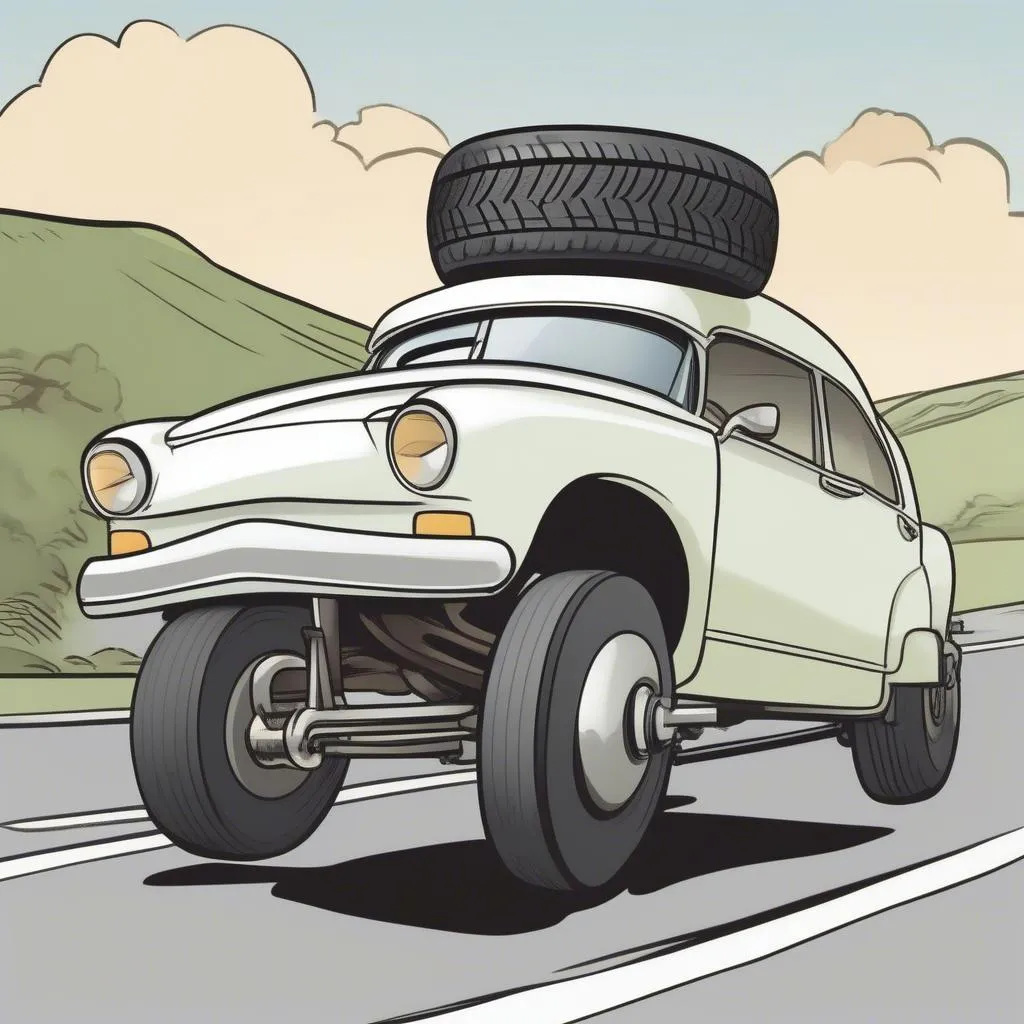“My truck vibrates when driving, especially at highway speeds!” Sound familiar? You’re not alone. This is a common complaint among truck owners, and it can be a real head-scratcher to figure out the cause. One minute you’re cruising down the I-95 in Virginia, the next, it feels like your Ford F-150 is doing the jitterbug.
But don’t worry, this article will help you diagnose the problem and get your ride running smoothly again.
Understanding the Shakes: What Does “Truck Vibrates When Driving” Really Mean?
Before we dive into the solutions, let’s define the problem. When we say “truck vibrates,” we’re talking about anything from a light tremor to a bone-rattling shake. This vibration can occur at various speeds, be constant or intermittent, and originate from different parts of your vehicle.
Think of it like this: Imagine you’re at a rock concert in Los Angeles. A gentle vibration might be like the bass during a ballad, while an intense shake is the entire stadium during the headliner’s guitar solo. Each vibration points to a different potential issue.
Diagnosing the Shakes: Common Causes of Truck Vibrations
Here are some of the most common culprits behind those unwanted vibrations:
1. Tire Troubles: The Usual Suspects
More often than not, tire issues are the root of the problem. This rings true whether you’re driving a heavy-duty RAM 3500 or a nimble Toyota Tacoma.
- Unbalanced tires: Imagine a washing machine on spin cycle without counterweights. That’s what happens when your tires are unbalanced.
- Misaligned wheels: Think of a shopping cart with a wonky wheel. Misaligned wheels can cause your truck to pull to one side and vibrate.
- Worn-out tires: Just like your favorite pair of boots, tires wear down over time, leading to uneven surfaces and vibrations.
Expert Insight: “Tire issues are the most common cause of vehicle vibrations, especially in trucks,” says John Miller, a seasoned mechanic with over 20 years of experience at a Chevrolet dealership in Texas. “A simple tire rotation and balance can often solve the problem.”
2. Driveline Dilemmas: Going Beyond the Tires
If your tires check out, the problem might lie within the components responsible for transferring power from your engine to your wheels.
- Worn-out U-joints: These joints connect your driveshaft to the transmission and differential. When they wear out, you might experience vibrations, especially during acceleration.
- Damaged driveshaft: This long metal tube spins rapidly to propel your truck forward. If it’s bent or damaged, you’ll likely feel vibrations at higher speeds.
3. Engine and Transmission Issues: The Heart of the Matter
While less common, vibrations can also stem from your truck’s engine or transmission.
- Spark plugs and ignition problems: A misfiring engine can cause a noticeable vibration, especially at idle or low speeds.
- Transmission mounts: These mounts secure your transmission to the frame. Worn-out mounts can cause vibrations, especially when shifting gears.
Did You Know? Regular maintenance, including wheel alignments and tire rotations, can prevent many vibration issues.
Getting Back on Track: Solutions for a Smooth Ride
The solution to your vibrating truck depends on the root cause. Here’s a breakdown:
- Tire Issues: Tire balancing, wheel alignment, or tire replacement are the usual fixes.
- Driveline Problems: Replacing worn U-joints or a damaged driveshaft is crucial for a smooth and safe ride.
- Engine and Transmission Issues: Addressing spark plug problems, ignition issues, or replacing worn-out transmission mounts can often resolve vibrations.
Pro Tip: If you’re unsure about the cause of your truck’s vibrations, consult a trusted mechanic or dealership service center. They have the expertise and diagnostic tools to pinpoint the problem and recommend the appropriate solution.
Still Feeling the Shakes? Explore Further
- Car Vibrates When Accelerating: Discover the causes and solutions for vibrations specifically occurring during acceleration. Read more here: [link to https://diagxcar.com/car-vibrates-when-accelerating/ with appropriate anchor text like “car vibrates when accelerating”]
- Do FICMs Have to Be Checked with a Scan Tool?: Learn about the role of FICMs in engine performance and whether they require specialized diagnostic tools. Find out more: [link to https://diagxcar.com/do-ficms-have-to-be-checked-with-a-scan-tool/ with appropriate anchor text like “Do FICMs Have to Be Checked with a Scan Tool?”]
FAQs About Truck Vibrations
Q: My truck only vibrates at high speeds. What could be the cause?
A: Vibrations at high speeds often point to tire issues, such as imbalance or misalignment. However, a damaged driveshaft can also cause vibrations at higher speeds.
Q: Can a bad wheel bearing cause my truck to vibrate?
A: Absolutely. Worn-out wheel bearings can cause noticeable vibrations, often accompanied by a humming or growling noise.
Q: How often should I get my tires rotated and balanced?
A: It’s generally recommended to rotate and balance your tires every 5,000 to 8,000 miles.
Need a Hand? We’re Here to Help!
Experiencing frustrating truck vibrations? Don’t let them ruin your next road trip! Our team of automotive experts is here to help. Contact us via Whatsapp at +84767531508 for expert advice and support on diagnostic tools and software. We offer 24/7 assistance to get you back on the road smoothly and safely.
Remember, regular maintenance and timely repairs are key to a smooth and enjoyable driving experience. Keep your truck in top shape, and it will keep you rolling for miles to come!


